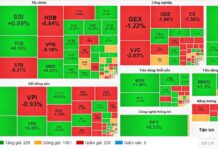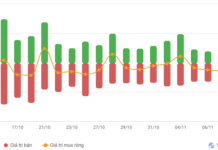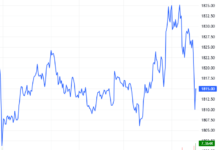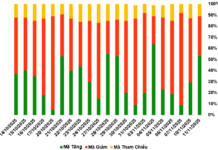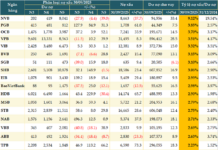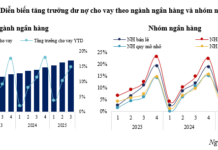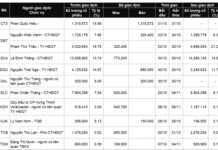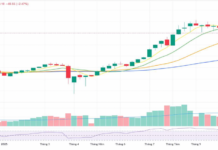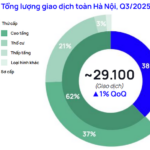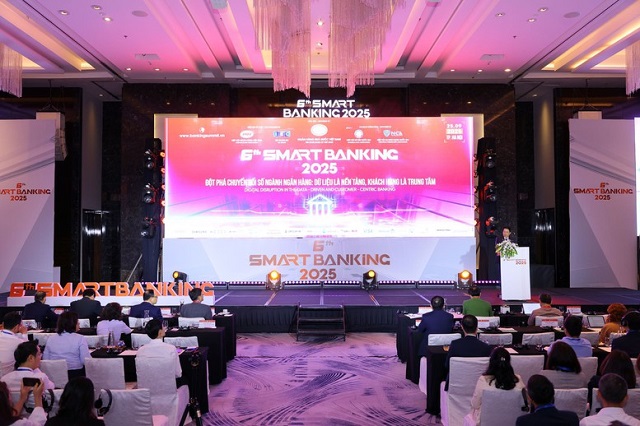
The annual High-Level Banking Seminar and Exhibition – Smart Banking 2025, themed “Breakthroughs in Digital Transformation: Data as the Foundation, Customers at the Core,” as seen in the photo by VGP/HT.
|
Data as the Foundation, Customers at the Core
On September 25th, at the annual High-Level Banking Seminar and Exhibition – Smart Banking 2025, themed “Breakthroughs in Digital Transformation: Data as the Foundation, Customers at the Core,” Deputy Governor of the State Bank of Vietnam (SBV) Pham Tien Dung emphasized: Ensuring security and maintaining safe, uninterrupted operations are paramount for the entire banking sector.
According to Deputy Governor Pham Tien Dung, data and customers, though distinct, are inseparable. Without customers, there is no data; without proper utilization, data holds no value. This is the core narrative for the banking industry at present.
Legally, the SBV is among the few ministries to issue a comprehensive system of circulars regulating the entire process of data collection, aggregation, and analysis. In banking, all data operates within a legal framework, from statistical reports and credit monitoring to the CIC system, anti-money laundering measures, and operational applications.
Deputy Governor Pham Tien Dung affirmed the data processing mantra: “Accurate – Complete – Clean – Live.” Concurrently, data must meet two critical requirements: efficient exploitation and the development of smart, integrated, user-friendly applications for customers.
To date, the banking sector has deeply integrated with the National Population Database and is the first to issue a Circular on Open API, enabling third-party connections to banking data.
Mr. Pham Tien Dung stressed: Data is a valuable resource, but customers are the core. Therefore, the banking sector must create intelligent, convenient applications that ensure safety and protect customers’ legal rights.
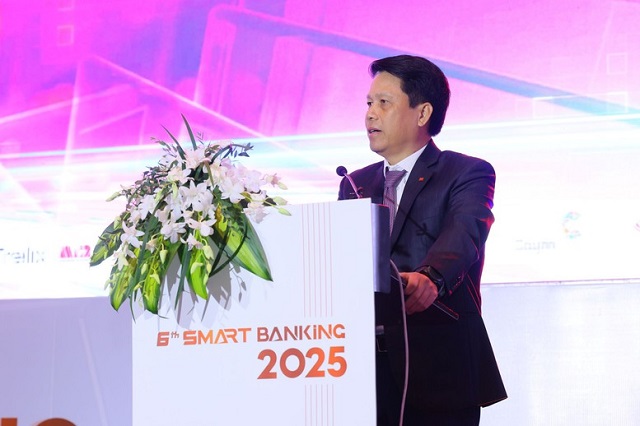 Deputy Governor Pham Tien Dung speaking at the seminar, as captured by VGP/HT.
|
The Deputy Governor also noted that the SBV has mandated all banks to develop applications adhering to international standards to better serve customers. Currently, 98% of customers transact via digital channels. In a single day, the banking system records over 30 million transactions valued at approximately 900 trillion VND, equivalent to 40 billion USD.
“With such massive transaction volumes, ensuring security, safety, and uninterrupted operations is a top priority. Beyond theory, we need concrete solutions to protect customers, ensuring their happiness and safety when using banking services,” the Deputy Governor stated.
Deputy Governor Pham Tien Dung reiterated the data processing principle: “Accurate – Complete – Clean – Live.” Alongside this, data must fulfill two key demands: effective utilization and the creation of smart, integrated, user-friendly applications for customers.
To date, the banking sector has deeply integrated with the National Population Database and pioneered the issuance of a Circular on Open API, facilitating data connectivity within the banking industry.
Mr. Pham Tien Dung emphasized: Data is invaluable, but customers are central. Thus, the banking sector must develop smart, convenient applications that ensure safety and safeguard customers’ legal rights.
The Deputy Governor also mentioned that the SBV has required all banks to develop applications compliant with international standards to enhance customer service. Currently, 98% of customers use digital channels for transactions. In a single day, the banking system processes over 30 million transactions worth around 900 trillion VND, or 40 billion USD.
“Given the colossal transaction scale, ensuring security, safety, and uninterrupted operations is a critical priority. Beyond theoretical discussions, we need practical solutions to protect customers, ensuring their well-being and safety in banking services,” the Deputy Governor added.
Ensuring Security, Safety, and Continuity in Banking Operations
Mr. Nguyen Quoc Hung, Vice Chairman and Secretary-General of the Vietnam Banks Association, noted that most basic banking services are now digitized across electronic channels. Many banks report over 95% of transactions conducted digitally rather than at counters.
The digital banking ecosystem is increasingly diverse and intelligent, offering services from money transfers and bill payments to online savings and loans via mobile devices. Currently, nearly 87% of Vietnamese adults have bank accounts; the total value of payment transactions through the banking system is approximately 25 times the GDP.
In the first seven months of 2025, QR code transactions increased by 66.73% in volume and 159% in value compared to the same period in 2024. Vietnam has also pioneered cross-border retail payments via QR codes with Thailand, Laos, and Cambodia.
However, to achieve breakthroughs in the coming period, the banking sector must address multiple challenges simultaneously: standardizing data, establishing a unified architecture, creating a consistent governance framework for data, security, privacy, and ethical data usage; enhancing controlled data interoperability; and improving real-time analytics for credit decision-making, risk management, and fraud monitoring.
“Customers must be at the core of value, experience, safety, and trust – not just a slogan,” Mr. Nguyen Quoc Hung emphasized.
In his presentation, Mr. Pham Anh Tuan, Director of the SBV’s Payment Department, summarized the banking sector’s digital transformation achievements and outlined strategic directions for 2026–2030. Meanwhile, Dr. Can Van Luc, Chief Economist at BIDV and member of the National Financial and Monetary Policy Advisory Council, discussed the legal framework for data and AI in banking, offering recommendations for regulators: accelerate institutional improvements, issue timely guidelines for the Personal Data Protection Law, adopt a proactive approach to AI, Cloud, and Blockchain, and work towards an AI Law by 2026.
Experts also advised credit institutions to proactively develop AI strategies, invest in IT infrastructure and cybersecurity, enhance data and AI workforce quality, and strengthen collaborations with BigTech and Fintech.
From a commercial bank management perspective, Mr. Nguyen Hung, CEO of TPBank, shared data governance insights: building dedicated data centers, cleaning data, preventing leaks, and ensuring compliance with security principles.
Mr. Hung stressed: Data is only valuable when properly utilized, refined into a “diamond” to effectively support business operations and AI training.
Compliance with the Personal Data Protection Law and related data regulations is a new challenge. This requires banks to obtain data subjects’ consent when processing personal information, thereby enhancing transparency and protecting customer rights.
Delegates agreed that banking digital transformation is not just about technology but a comprehensive restructuring process: from data governance and security to workforce training and legal framework improvements. The ultimate goal is clear: accurate, clean, legal data; customer-centricity; ensured safety and security; and continuous, efficient banking operations.
– 08:45 26/09/2025
Revolutionizing Finance & Real Estate: Citics and VPBank Partner to Build a Digital Ecosystem
On September 19, 2025, in Hanoi, Citics Group Joint Stock Company (Citics) and Vietnam Prosperity Joint Stock Commercial Bank (VPBank) officially signed an expanded cooperation agreement, marking a strategic milestone in combining financial and banking strengths with real estate technology expertise.
State Audit Office Tightens Cybersecurity as Vietnam Ranks Among Top 10 Most Cyber-Attacked Nations Globally
On the afternoon of September 23rd, at the headquarters of the State Audit Office of Vietnam (SAO), Deputy Auditor General Bùi Quốc Dũng chaired the Cybersecurity Drill Conference on the State Audit Office’s Information System. The event was jointly organized by the Information Technology Department of SAO, in collaboration with Viettel Cyber Security Company and NGS Equipment and Communication Joint Stock Company.
Vietbank Triumphs at the 2025 Asian Technology Excellence Awards
At the prestigious Asian Technology Excellence Awards 2025, held recently in Bangkok, Thailand, Vietbank was honored with the Digital Banking award. This recognition highlights the bank’s remarkable innovations in its Intelligent Management System (IMS), developed by its in-house IT team.

